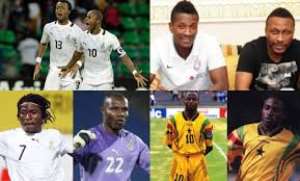 Some Ghanaian Soccer Icons. Image By TheAfricanDream.net
Some Ghanaian Soccer Icons. Image By TheAfricanDream.netOn a scorching Saturday in Accra, two boys stage a one-on-one match in a dusty lane behind a chop bar. Their goalposts are broken flip-flops, their ball is a half-inflated plastic ball. One of them cries, I’m “Partey,” the other insists I’m “Kudus.”
Everywhere in Ghana, from Bolga to Keta, this scene repeats: a dance of ingenuity, rhythm and raw skill. But a decade on, most of these chaps won’t make it to Europe, or even the Ghana Premier League. Because in Ghana, as in much of Africa, the problem isn’t talent. It’s what happens after talent is discovered — or more often, abandoned.
A Proud Legacy
Ghana’s football heritage is as deep as it is decorated:
4-time African Cup of Nations (AFCON) champions First African team to reach the final of a U-20 World Cup (2009 champions) Almost became the first African team to reach a World Cup semifinal in 2010, denied only by Suarez’s hand of God and Gyan’s miss — a moment burned into national memory.
Ghana’s brand of football has always blended flair with courage; dancing past defenders with the rhythm of highlife music, before dropping the hammer with Asamoah Gyan or Abedi Pele-like precision.
So how did such a storied football nation fall into years of administrative chaos, fan disillusionment and infrastructure rot?
The Ghosts of Governance
In 2018, Ghanaian football imploded.
An explosive exposé by investigative journalist Anas Aremeyaw Anas revealed widespread corruption in the Ghana Football Association (GFA). Referees and officials were filmed accepting bribes. Even the GFA President at the time, Kwesi Nyantakyi, was implicated and subsequently banned by FIFA.
The government disbanded the GFA. Domestic football ground to a halt. Sponsorships faded. Confidence collapsed. “It was like turning off the power supply to an entire footballing nation,” said a past Hearts of Oak board member.
Though the GFA has since been reconstituted and elections held, fidelity remains fragile. Many fans view the league with pessimism, clubs with incredulity and national team selections with misgiving.
The Ghana Premier League: A Sleeping Giant
While the Black Stars make headlines, the Ghana Premier League (GPL) struggles to draw spectators, or integrity.
Most stadia are dilapidated; pitches are overgrown or dusty; players are underpaid, often going months without wages; media coverage is trifling, with little access to quality data or highlight reels; and the best talents leave before age 20, heading to Scandinavia, Belgium, or third-tier Turkish sides, often through unofficial agents.
There were several instances where the top scorers of the GPL left for other leagues for peanuts. Imagine that — in a country where football is a near religion.
The World Cup Rollercoaster
Ghana’s return to the World Cup stage in 2022 (after missing 2018) sparked cautious excitement. The team was stacked with new recruits from the diaspora: Inaki Williams, Tariq Lamptey, Mohammed Salisu — but needed cohesion.
They fought admirably. Beat South Korea. Gave Portugal a scare. Then collapsed to Uruguay in a vengeful rematch that reignited 2010’s trauma.
The talent was evident. The identity was not.
“The Black Stars used to be feared,” said a veteran journalist. “Now, we’re experimental. And the fans feel that.”
Bright Spots: Coaching, Youth and Diaspora
Amid the gloom, there’s hope.
Chris Hughton, the former Brighton manager, took over in 2023 with a mandate to instill structure, modern systems and professionalism. What happened then, by the way?
Ghana continues to produce top-level talent:
Mohammed Kudus (Spurs) – one of Europe’s most electric attacking midfielders Kamaldeen Sulemana, Ernest Nuamah, Ibrahim Osman – a new generation born in academy systems like Right to Dream and WAFA
Ghana’s diaspora outreach is finally strategic, not panicked. Dissimilar to previous years of last-minute call-ups, the GFA now targets players early, integrating them into U-20 and U-23 teams.
Still, this pipeline needs alignment, not just recruitment.
Talent vs. System: The Ghanaian Paradox
Ghana produces world-class footballers. But it doesn’t keep them, develop them consistently or translate that into collective success.
Why?
Coaching inconsistency: frequent changes, ideological confusion. No technical blueprint: Is Ghana a pressing team? A possession side? A counter attacking team? No clear philosophy. Commercial mishandling: no effective league promotion or marketing. Infrastructure decay: Kotoko and Hearts of Oak play in awful stadia older than many players.
George Boateng, former Ghana assistant coach lamented on the massive decline and blamed the Ghana Football Association (GFA) for its poor decision making.
Humor, Heartache, and Hope
Ghanaian football is never dull. It is a telenovela with midfielders.
It’s the only place where a striker might invoke Jesus after missing a sitter — and still get a second chance. And, despite it all, people still show up. Not in droves, but in devotion.
The Way Forward
Ghana’s football future doesn’t need reinvention — it needs realignment.
Strengthen the GPL — better pitches, fair player salaries, digital marketing. Rebuild trust in the GFA — transparency, fan engagement and data access. Create a football philosophy — from U-15s to Black Stars. Invest in coaching education — not just player exports.
Ghana doesn’t lack tacklers, dribblers, passers or scorers. It lacks structure.
And structure is what turns chaos into championships.
By James Attah Ansah
Email: [email protected]
Website: https://jaansahpublications.com


